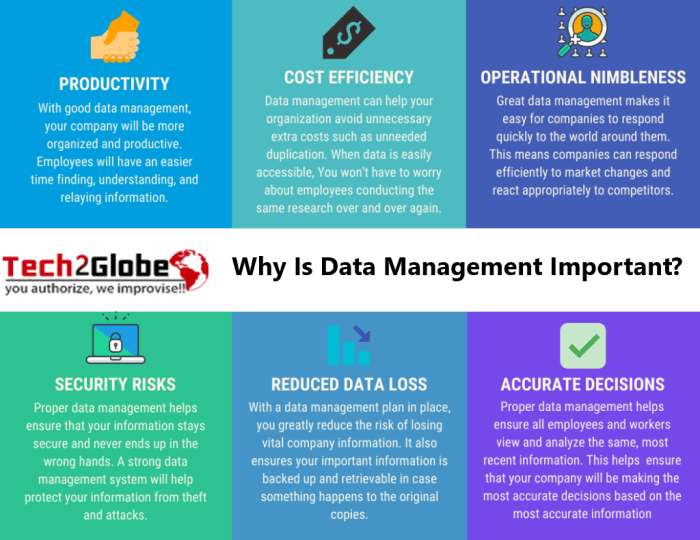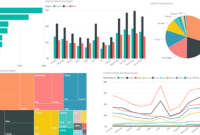Data management solutions are crucial for businesses in today’s digital age, ensuring streamlined operations and regulatory adherence. Dive into the world of efficient data handling with this comprehensive guide.
Overview of Data Management Solutions
Data management solutions play a crucial role in modern businesses by helping organizations effectively collect, store, organize, and utilize their data. These solutions are essential for maintaining data accuracy, consistency, and security, ultimately leading to informed decision-making and improved operational efficiency.
Key Components of Effective Data Management Solutions
- Data Integration: Seamless integration of data from various sources to create a unified view.
- Data Quality Management: Ensuring data accuracy, completeness, and consistency.
- Data Governance: Establishing policies and procedures to manage data assets effectively.
- Data Security: Implementing measures to protect data from unauthorized access or breaches.
- Data Storage and Retrieval: Efficient storage and retrieval mechanisms for quick access to data when needed.
Industries Benefiting from Data Management Solutions
- Healthcare: Improving patient care and outcomes through better data management.
- Retail: Enhancing customer experiences and optimizing inventory management.
- Finance: Ensuring regulatory compliance and safeguarding sensitive financial information.
- Manufacturing: Streamlining production processes and supply chain management.
Challenges Without Proper Data Management Solutions
- Data Silos: Disconnected data sources leading to inefficiencies and data inconsistencies.
- Poor Decision Making: Without reliable data, organizations may make inaccurate or uninformed decisions.
- Data Security Risks: Vulnerabilities to cyber threats and data breaches due to inadequate protection measures.
- Lack of Compliance: Failing to meet regulatory requirements and facing legal consequences.
Types of Data Management Solutions

Data management solutions come in various forms to cater to different organizational needs. Let’s explore the differences between cloud-based and on-premise solutions, the features of database management systems (DBMS), and the role of data governance in ensuring data quality.
Cloud-based vs. On-premise Solutions
Cloud-based data management solutions offer scalability, flexibility, and cost-effectiveness since they are hosted on remote servers accessed via the internet. On the other hand, on-premise solutions involve storing and managing data within the organization’s physical infrastructure, providing more control but requiring higher upfront costs and maintenance.
Features of Database Management Systems (DBMS)
Database management systems (DBMS) are crucial components of data management solutions, offering features like data storage, retrieval, and manipulation. They provide structured access to databases, ensuring data integrity, security, and efficiency in handling large volumes of data.
Role of Data Governance in Ensuring Data Quality
Data governance plays a vital role in maintaining data quality within management solutions by establishing policies, processes, and controls to ensure data accuracy, consistency, and compliance. It involves defining data standards, roles, and responsibilities to enhance data reliability and usability across the organization.
Implementing Data Management Solutions

Implementing data management solutions is crucial for businesses to effectively organize, store, and utilize their data. Here is a step-by-step guide on how to select the right data management solution, best practices for implementation, and tips on integrating with existing IT infrastructure.
Selecting the Right Data Management Solution
When selecting a data management solution for your business, consider the following steps:
- Assess your data needs and objectives to determine the specific features and functionalities required.
- Research different data management solutions available in the market and compare their capabilities, scalability, and pricing.
- Request demos or trials from potential vendors to test the usability and compatibility of the solution with your business requirements.
- Consult with IT experts or data management professionals to get their insights and recommendations on the best fit for your organization.
- Choose a solution that aligns with your budget, security requirements, and long-term business goals.
Best Practices for Implementation
To ensure a successful implementation of data management solutions, consider the following best practices:
- Develop a comprehensive implementation plan with clear objectives, timelines, and responsibilities assigned to team members.
- Provide adequate training and support to employees to ensure they understand how to use the data management solution effectively.
- Regularly monitor and evaluate the performance of the data management solution to identify any issues or areas for improvement.
- Establish data governance policies and procedures to maintain data quality, security, and compliance with regulations.
- Collaborate with stakeholders across different departments to gather feedback and insights for continuous enhancement of the data management solution.
Integrating with Existing IT Infrastructure, Data management solutions
Integrating data management solutions with existing IT infrastructure can be seamless by following these tips:
- Conduct a thorough assessment of your current IT systems to identify potential integration points and dependencies.
- Coordinate with IT teams to ensure compatibility and interoperability between the data management solution and existing software applications.
- Implement data migration strategies to transfer data from legacy systems to the new data management solution without losing integrity or consistency.
- Test the integration thoroughly to address any compatibility issues or data inconsistencies before full deployment.
- Maintain regular communication and collaboration between IT teams, vendors, and stakeholders to address any challenges during the integration process.
Benefits of Data Management Solutions

Data management solutions offer a wide array of benefits to organizations, ranging from regulatory compliance to cost savings and improved decision-making processes.
Regulatory Compliance
Data management solutions play a crucial role in helping organizations comply with various regulations and standards. By maintaining accurate and secure data records, businesses can ensure that they meet legal requirements and industry guidelines. This not only helps in avoiding costly fines and penalties but also enhances the overall reputation of the organization.
Cost-saving Aspects
Implementing efficient data management solutions can lead to significant cost savings for organizations. By streamlining data storage, retrieval, and analysis processes, businesses can reduce operational expenses associated with manual data handling. Additionally, improved data accuracy and consistency can minimize errors and redundancies, further lowering costs in the long run.
Improved Decision-making Processes
Data management solutions provide organizations with access to real-time, accurate, and relevant data, enabling informed decision-making processes. By centralizing data sources and ensuring data quality, businesses can make strategic decisions based on reliable information. This helps in optimizing operations, identifying new opportunities, and staying competitive in a rapidly evolving market landscape.
In conclusion, embracing data management solutions not only enhances compliance and efficiency but also fosters better decision-making processes. Stay ahead of the curve by implementing robust data management strategies today.
When it comes to BI analytics , companies are constantly seeking ways to leverage data for better decision-making. By utilizing advanced tools and technologies, businesses can extract valuable insights to drive growth and innovation.
Implementing effective BI solutions is essential for organizations looking to streamline operations and improve overall performance. These solutions enable businesses to analyze data in real-time, leading to more informed strategic decisions.
Utilizing top-notch Business reporting tools is crucial for generating comprehensive reports that provide insights into various aspects of a company’s performance. These tools help businesses track key metrics and make data-driven decisions to stay competitive in the market.




